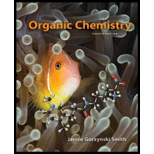
Organic Chemistry
4th Edition
ISBN: 9780073402772
Author: Janice G. Smith
Publisher: MCG
expand_more
expand_more
format_list_bulleted
Concept explainers
Question
Chapter 27, Problem 27.22P
Interpretation Introduction
Interpretation: The product formed on protonation of the intermediate enolate formed in anionic oxy-Cope rearrangement of given unsaturated alcohol is to be predicted.
Concept introduction: Anionic oxy-Cope rearrangement is a thermal
Sigmatropic rearrangements are pericyclic reactions which takes place by concerted mechanism. In these rearrangements migration of sigma bond takes place.
Expert Solution & Answer
Want to see the full answer?
Check out a sample textbook solution
Students have asked these similar questions
Please help me solve this reaction.
Indicate the products obtained by mixing 2,2-dimethylpropanal with acetaldehyde and sodium ethoxide in ethanol.
Synthesize 2-Ethyl-3-methyloxirane from dimethyl(propyl)sulfonium iodide using the necessary organic or inorganic reagents. Draw the structures of the compounds.
Chapter 27 Solutions
Organic Chemistry
Ch. 27 - Prob. 27.1PCh. 27 - Problem 27.2
For each molecular orbital in Figure...Ch. 27 - Problem 27.3
(a) Using Figure 27.2 as a guide,...Ch. 27 - Problem 27.4
(a) How many molecular orbitals are...Ch. 27 - Prob. 27.5PCh. 27 - Prob. 27.6PCh. 27 - Prob. 27.7PCh. 27 - Prob. 27.8PCh. 27 - Prob. 27.9PCh. 27 - Prob. 27.10P
Ch. 27 - Problem 27.11
What product would be formed by the...Ch. 27 - Consider cycloheptatrienone and ethylene, and draw...Ch. 27 - Problem 27.13
Show that a thermal suprafacial...Ch. 27 - Prob. 27.14PCh. 27 - a Draw the product of the following [4+2]...Ch. 27 - Prob. 27.16PCh. 27 - Prob. 27.17PCh. 27 - Problem 27.18
Using orbital symmetry, explain why...Ch. 27 - Prob. 27.19PCh. 27 - Prob. 27.20PCh. 27 - Prob. 27.21PCh. 27 - Prob. 27.22PCh. 27 - Prob. 27.23PCh. 27 - Problem 27.25
(a) What product is formed by the...Ch. 27 - Prob. 27.25PCh. 27 - Prob. 27.26PCh. 27 - Prob. 27.27PCh. 27 - Prob. 27.28PCh. 27 - Prob. 27.29PCh. 27 - Prob. 27.30PCh. 27 - Prob. 27.31PCh. 27 - Prob. 27.32PCh. 27 - Prob. 27.33PCh. 27 - Prob. 27.34PCh. 27 - Prob. 27.35PCh. 27 - Prob. 27.36PCh. 27 - Prob. 27.37PCh. 27 - Prob. 27.38PCh. 27 - Prob. 27.39PCh. 27 - Prob. 27.40PCh. 27 - Prob. 27.41PCh. 27 - Prob. 27.42PCh. 27 - Prob. 27.43PCh. 27 - Prob. 27.44PCh. 27 - Prob. 27.45PCh. 27 - 27.47 What product is formed from the [5,5]...Ch. 27 - 27.49 Draw structures for A, B, and C in the...Ch. 27 - Prob. 27.48PCh. 27 - Prob. 27.49PCh. 27 - 27.52 Draw the products of each reaction.
c....Ch. 27 - Prob. 27.51PCh. 27 - 27.54 Draw a stepwise, detailed mechanism for the...Ch. 27 - Prob. 27.53PCh. 27 - Prob. 27.54PCh. 27 - 27.58 Draw a stepwise, detailed mechanism for the...Ch. 27 - Prob. 27.56PCh. 27 - Prob. 27.57PCh. 27 - Prob. 27.58PCh. 27 - Prob. 27.59P
Knowledge Booster
Learn more about
Need a deep-dive on the concept behind this application? Look no further. Learn more about this topic, chemistry and related others by exploring similar questions and additional content below.Similar questions
- Synthesize 2-Hydroxy-2-phenylacetonitrile from phenylmethanol using the necessary organic or inorganic reagents. Draw the structures of the compounds.arrow_forwardSynthesize N-Methylcyclohexylamine from cyclohexanol using the necessary organic or inorganic reagents. Draw the structures of the compounds.arrow_forwardSynthesize N-Methylcyclohexylamine from cyclohexanol using the necessary organic or inorganic reagents. Draw the structures of the compounds.arrow_forward
- If possible, please provide the formula of the compound 3,3-dimethylbut-2-enal.arrow_forwardSynthesize 1,4-dibromobenzene from acetanilide (N-phenylacetamide) using the necessary organic or inorganic reagents. Draw the structures of the compounds.arrow_forwardIndicate the products obtained by mixing (3-oxo-3-phenylpropyl)triphenylphosphonium bromide with sodium hydride.arrow_forward
- We mix N-ethyl-2-hexanamine with excess methyl iodide and followed by heating with aqueous Ag2O. Indicate the major products obtained.arrow_forwardIndicate the products obtained by mixing acetophenone with iodine and NaOH.arrow_forwardIndicate the products obtained by mixing 2-Propanone and ethyllithium and performing a subsequent acid hydrolysis.arrow_forward
- Indicate the products obtained if (E)-2-butenal and 3-oxo-butanenitrile are mixed with sodium ethoxide in ethanol.arrow_forwardQuestion 3 (4 points), Draw a full arrow-pushing mechanism for the following reaction Please draw all structures clearly. Note that this intramolecular cyclization is analogous to the mechanism for halohydrin formation. COH Br + HBr Brarrow_forwardIndicate the products obtained if 2,2-dimethylpropanal and acetaldehyde are mixed with sodium ethoxide in ethanol.arrow_forward
arrow_back_ios
SEE MORE QUESTIONS
arrow_forward_ios
Recommended textbooks for you

 Organic ChemistryChemistryISBN:9781305580350Author:William H. Brown, Brent L. Iverson, Eric Anslyn, Christopher S. FootePublisher:Cengage Learning
Organic ChemistryChemistryISBN:9781305580350Author:William H. Brown, Brent L. Iverson, Eric Anslyn, Christopher S. FootePublisher:Cengage Learning


Organic Chemistry
Chemistry
ISBN:9781305580350
Author:William H. Brown, Brent L. Iverson, Eric Anslyn, Christopher S. Foote
Publisher:Cengage Learning